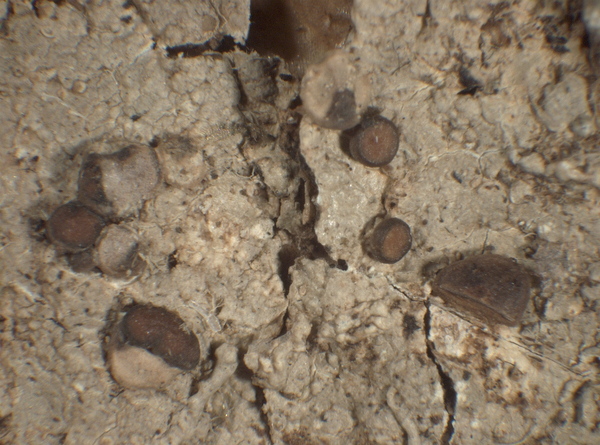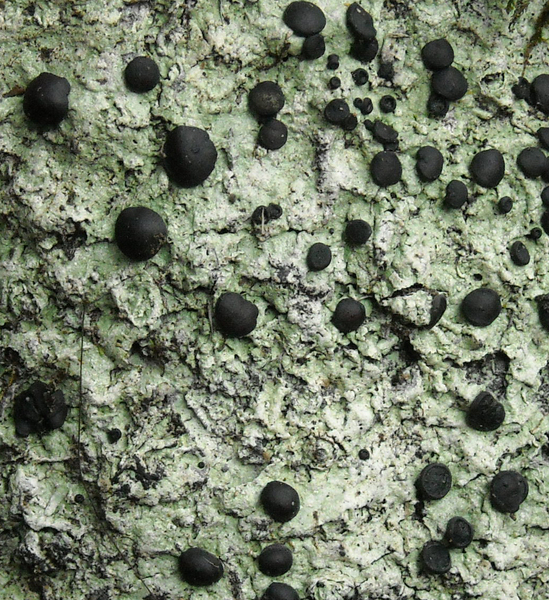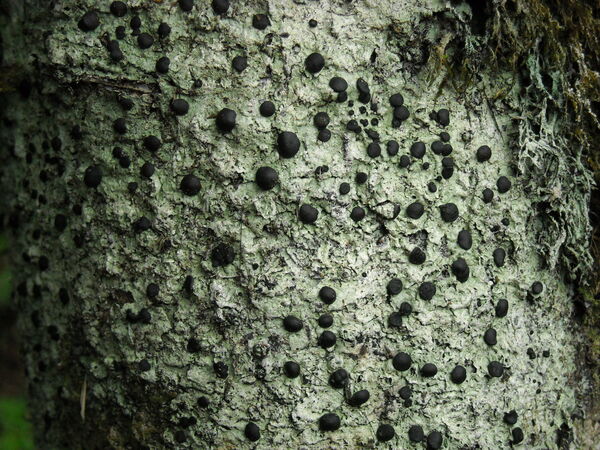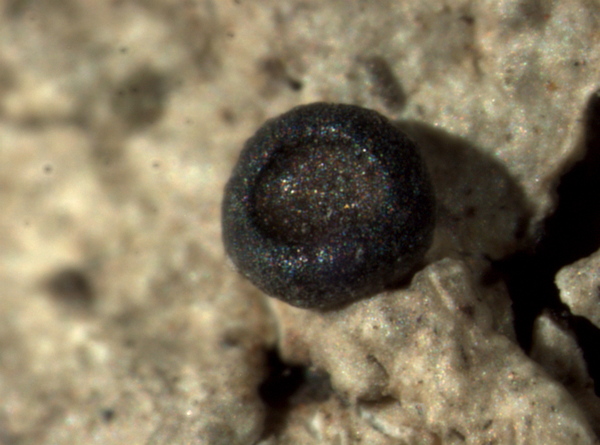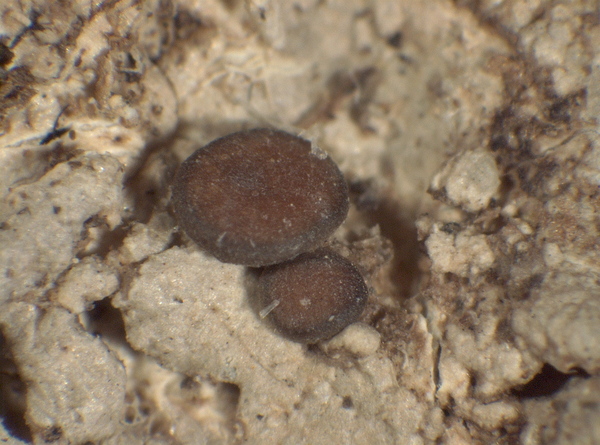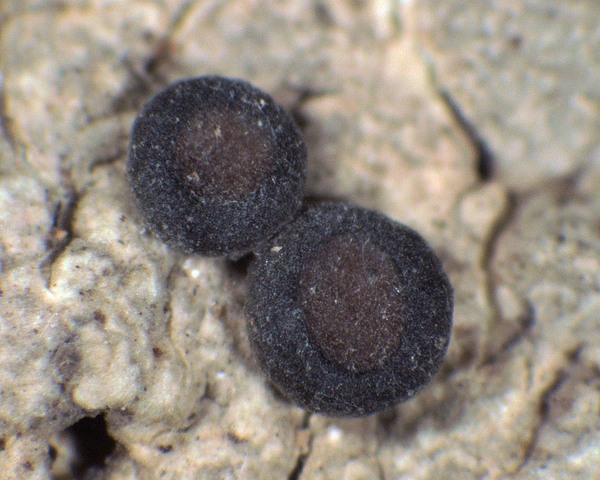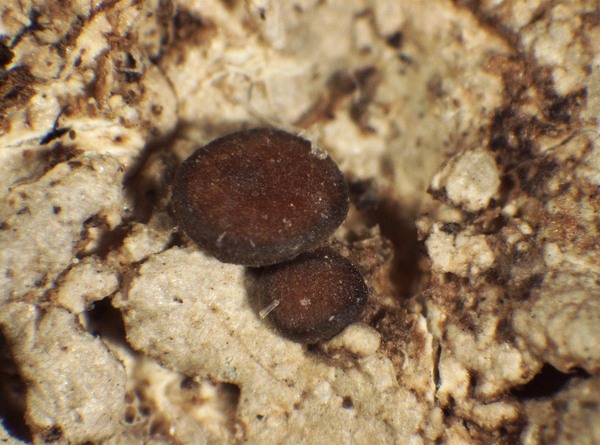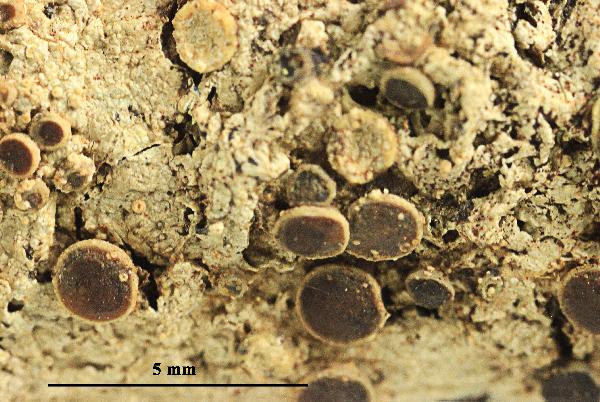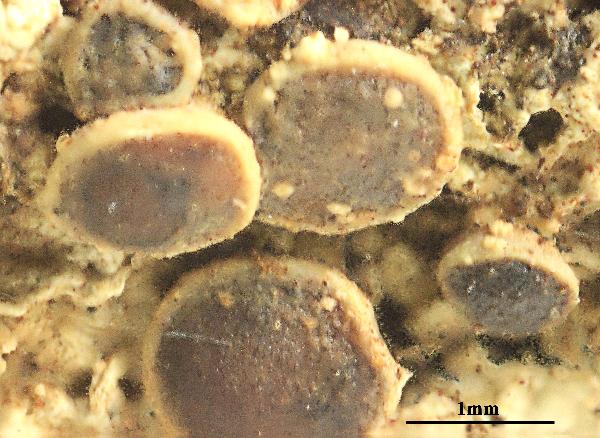Megalospora tuberculosa (Fée) Sipman
Bibl. Lichenol., 18: 156, 1983. Basionym: Lecidea tuberculosa Fée - Essai Crypt. Exot.: 107, 1825 (1824)
Synonyms: Bacidia pachycarpa (Delise ex Duby) Trevis.; Bacidia tuberculosa (Fée) Trevis.; Bombyliospora pachycarpa (Delise ex Duby) A. Massal.; Megalospora pachycarpa (Duby) H. Olivier
Distribution: N - Frl. C - Tosc.
Description: Thallus crustose to subleprose, episubstratic, up to 0.2 mm thick, dull, yellowish white, pale grey-green or grey-white, sorediate, forming large patches, without a distinct prothallus or with athin dark prothallus. Soralia at first more or less discrete, but soon becoming confluent, forming a more or less continuous sorediate crust; soredia fine to coarse, usually aggregated into up to 80 µm wide consoredia, often with needle-like projecting crystals. Apothecia very rare, rounded, (0.5-)1-2 mm across, with a concave to flat, dark brown disc and a paler or concolorous, raised, persistent proper margin. Proper exciple of radiating hyphae, compact and brown in outer part, loose-arachnoid and more or less colourless within; epithecium orange-brown, densely inspersed with granules not dissolving in K; hymenium colourless, 130-180 μm high, inspersed with oil droplets; paraphyses sparingly branched and anastomosing, slightly swollen at tips; hypothecium yellowish brown to brown. Asci 1-spored, clavate-subcylindrical, with a thick amyloid tholus and a I+ blue gelatinous outer layer. Ascospores (3-)5-11-septate, hyaline, 70-160 x 25-35 µm, the wall c. 2 μm thick. Conidia short-bacilliform. Photobiont chlorococcoid (Symbiochloris), the cells 5-14 μm wide. Spot tests: thallus: K+ pale yellow, C-, KC+ yellow, P- or P+ faintly yellow, UV-. Chemistry: usnic acid, zeorin, unknown terpenoids.Note: a mainly pantropical species found on old deciduous (mainly Fagus) and coniferous (mainly Abies) trees in humid montane forests, sometimes overgrowing epiphytic bryophytes. It is included in the Italian red list of epiphytic lichens as “Critically Endangered” (Nascimbene & al. 2013c).
Growth form: Crustose
Substrata: bark
Photobiont: green algae other than Trentepohlia
Reproductive strategy: mainly asexual, by soredia, or soredia-like structures (e.g. blastidia)
Restricted to humid-warm, oceanic areas
Commonnes-rarity: (info)
Alpine belt: absent
Subalpine belt: absent
Oromediterranean belt: absent
Montane belt: extremely rare
Submediterranean belt: absent
Padanian area: absent
Humid submediterranean belt: absent
Humid mediterranean belt: absent
Dry mediterranean belt: absent

Predictive model
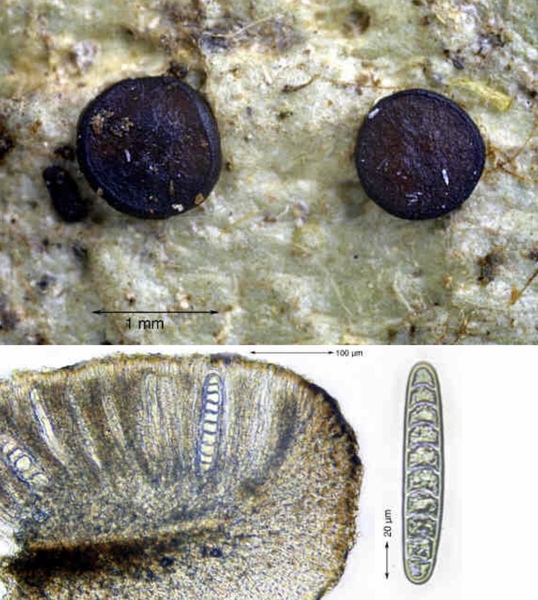

Felix Schumm – CC BY-SA 4.0
Image from: F. Schumm (2008) - Flechten Madeiras, der Kanaren und Azoren. Beck, OHG - ISBN: 978-3-00-023700-3
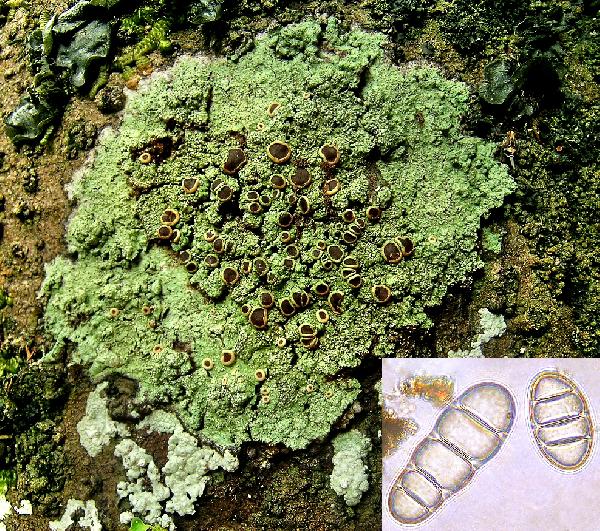
Ulrich Kirschbaum CC BY-SA 4.0 – Source: https://www.thm.de/lse/ulrich-kirschbaum/flechtenbilder
Portugal: Madeira. (950 m) on Laurus in laurisilva
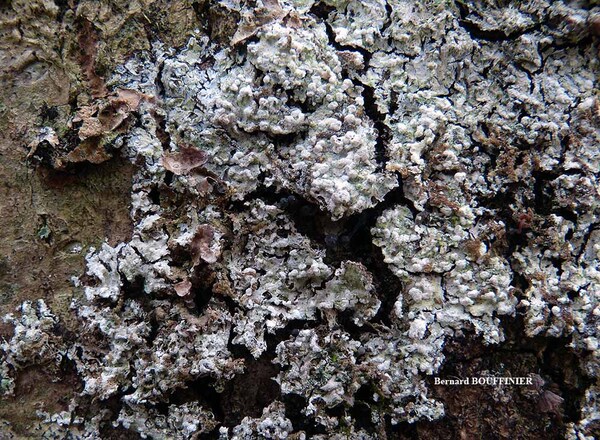
Bernard Bouffinier - Source: http://www.lichensmaritimes.org/index.php?task=fiche&lichen=698&lang=en
France, Rosnoen
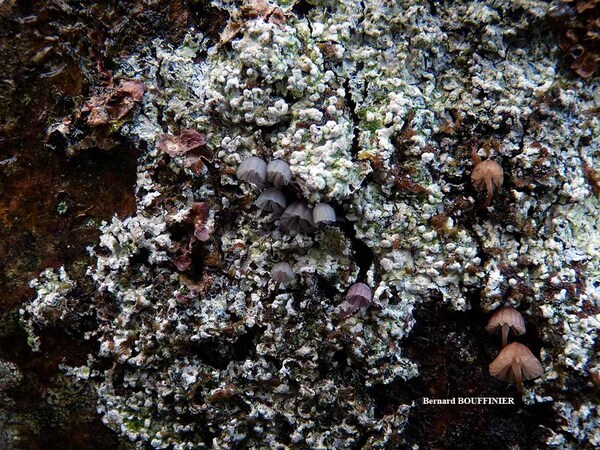
Bernard Bouffinier - Source: http://www.lichensmaritimes.org/index.php?task=fiche&lichen=698&lang=en
France, Rosnoen
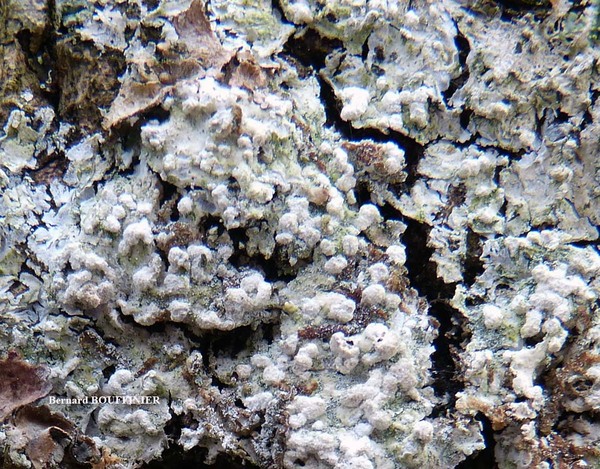
Bernard Bouffinier - Source: http://www.lichensmaritimes.org/index.php?task=fiche&lichen=698&lang=en
France, Rosnoen
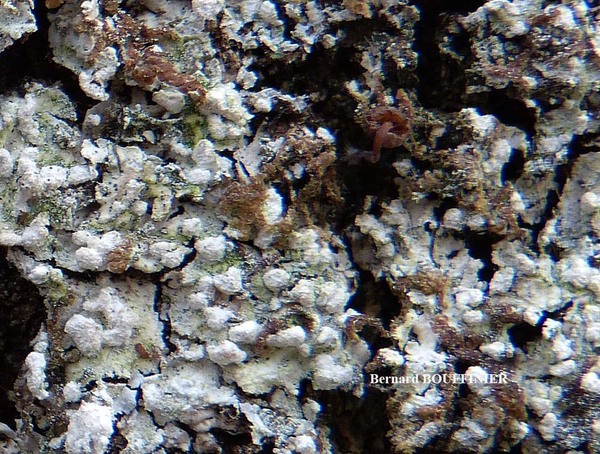
Bernard Bouffinier - Source: http://www.lichensmaritimes.org/index.php?task=fiche&lichen=698&lang=en
France, Rosnoen
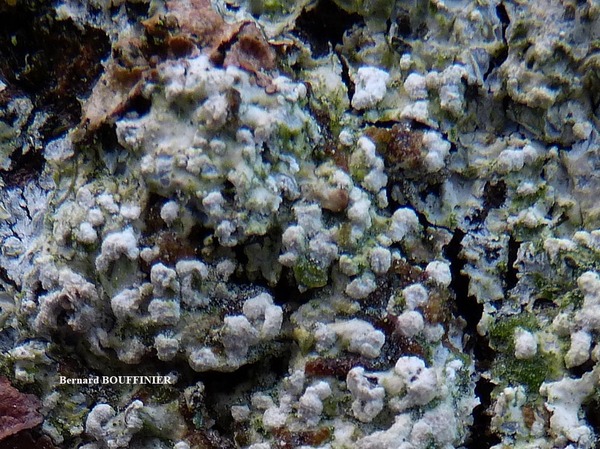
Bernard Bouffinier - Source: http://www.lichensmaritimes.org/index.php?task=fiche&lichen=698&lang=en
France, Rosnoen
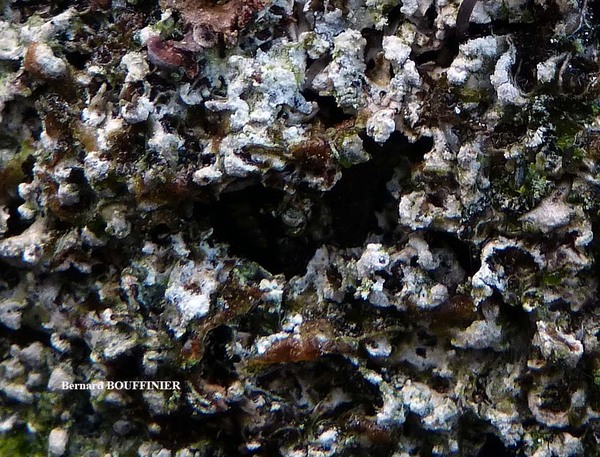
Bernard Bouffinier - Source: http://www.lichensmaritimes.org/index.php?task=fiche&lichen=698&lang=en
France, Rosnoen
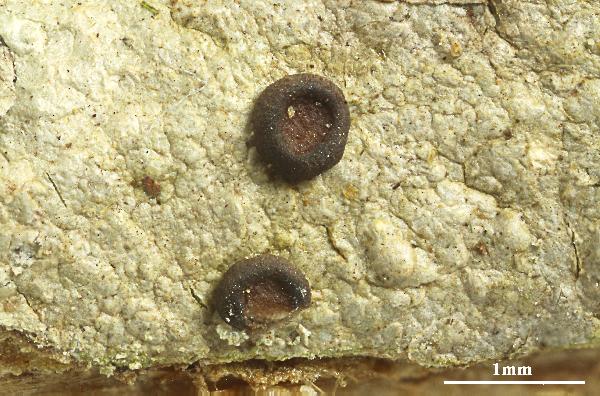

Felix Schumm - CC BY-SA 4.0
[ABL50834], Brazil, Alagoas, Quebrangulo, Pedra Talhada plot A2.1.
On tree bark in Atlantic rain forest. 9°15’ S, 36°25’35’’ W, 590 m. Leg.
M. Cáceres, A. Aptroot (no 50834) & J.G. Cavalcante, 24.07.2019. Det.
A. Aptroot,2019.
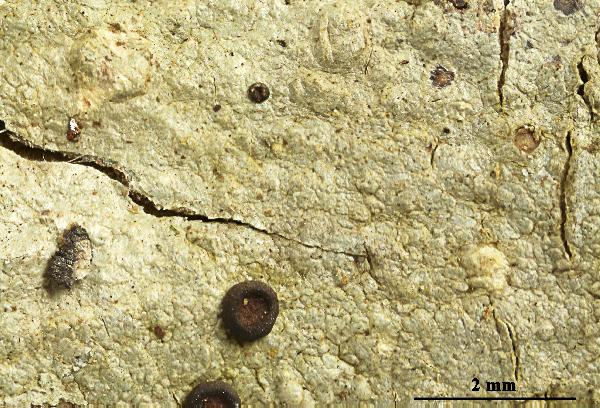

Felix Schumm - CC BY-SA 4.0
[ABL50834], Brazil, Alagoas, Quebrangulo, Pedra Talhada plot A2.1.
On tree bark in Atlantic rain forest. 9°15’ S, 36°25’35’’ W, 590 m. Leg.
M. Cáceres, A. Aptroot (no 50834) & J.G. Cavalcante, 24.07.2019. Det.
A. Aptroot,2019.
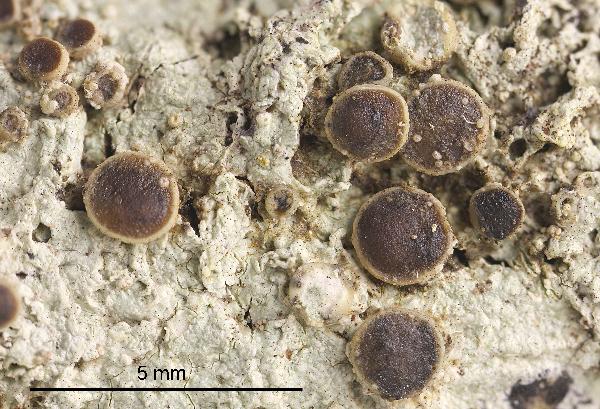

Felix Schumm - CC BY 4.0
[15388], La Reunion, Foret de Bébour, Sentier de Piton Bébour;
21,12860°S, 55,56962°E, 1300 m. Leg. F. Schumm & J.-P. Frahm,
12.09.2009, dt. F. .
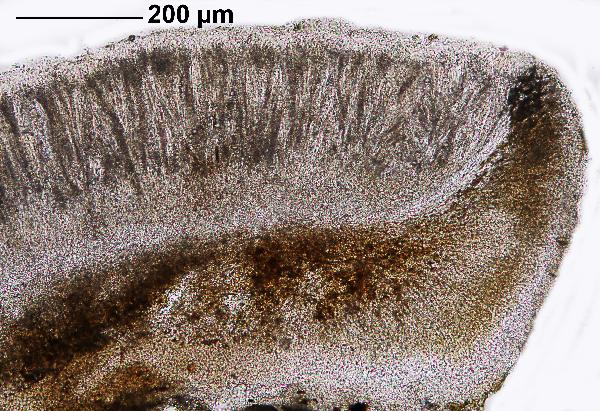

Felix Schumm - CC BY 4.0
[15388], La Reunion, Foret de Bébour, Sentier de Piton Bébour;
21,12860°S, 55,56962°E, 1300 m. Leg. F. Schumm & J.-P. Frahm,
12.09.2009, dt. F. .
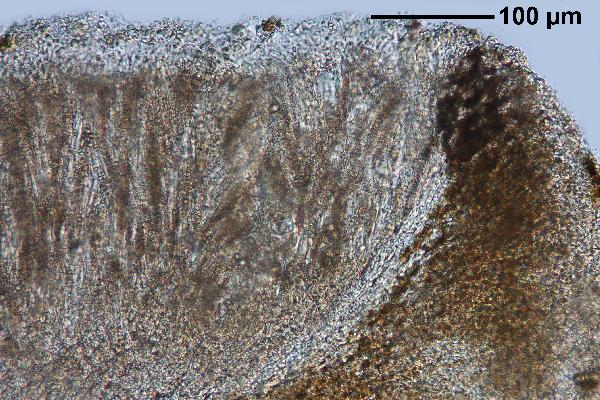

Felix Schumm - CC BY 4.0
[15388], La Reunion, Foret de Bébour, Sentier de Piton Bébour;
21,12860°S, 55,56962°E, 1300 m. Leg. F. Schumm & J.-P. Frahm,
12.09.2009, dt. F. .
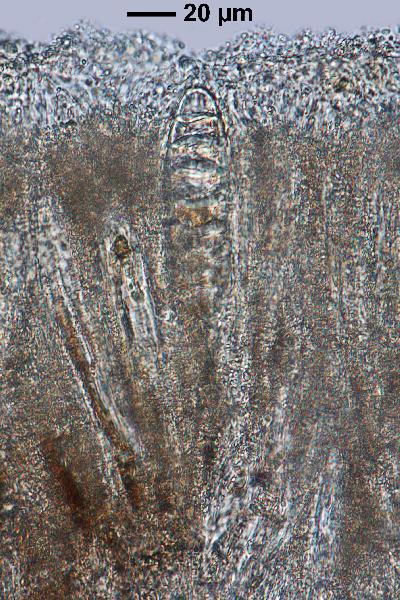

Felix Schumm - CC BY 4.0
[15388], La Reunion, Foret de Bébour, Sentier de Piton Bébour;
21,12860°S, 55,56962°E, 1300 m. Leg. F. Schumm & J.-P. Frahm,
12.09.2009, dt. F. .
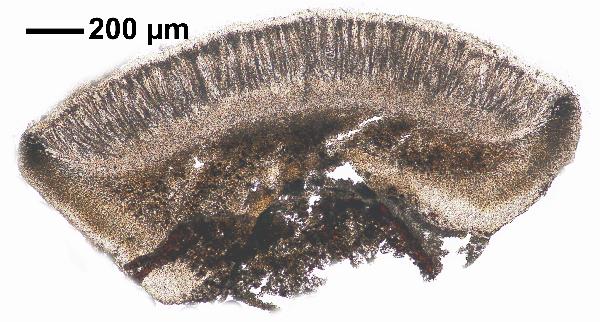

Felix Schumm - CC BY 4.0
[15388], La Reunion, Foret de Bébour, Sentier de Piton Bébour;
21,12860°S, 55,56962°E, 1300 m. Leg. F. Schumm & J.-P. Frahm,
12.09.2009, dt. F. .
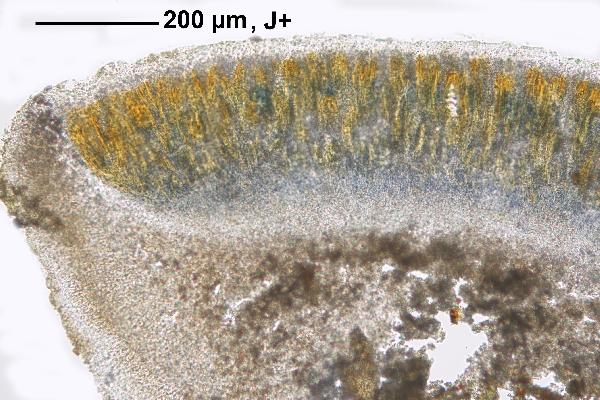

Felix Schumm - CC BY 4.0
[15388], La Reunion, Foret de Bébour, Sentier de Piton Bébour;
21,12860°S, 55,56962°E, 1300 m. Leg. F. Schumm & J.-P. Frahm,
12.09.2009, dt. F. .
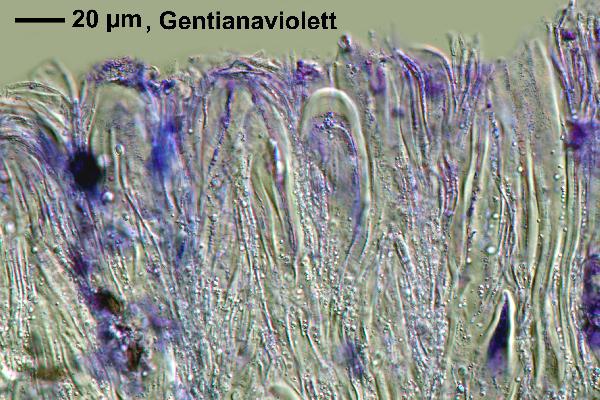

Felix Schumm - CC BY 4.0
[15388], La Reunion, Foret de Bébour, Sentier de Piton Bébour;
21,12860°S, 55,56962°E, 1300 m. Leg. F. Schumm & J.-P. Frahm,
12.09.2009, dt. F. .
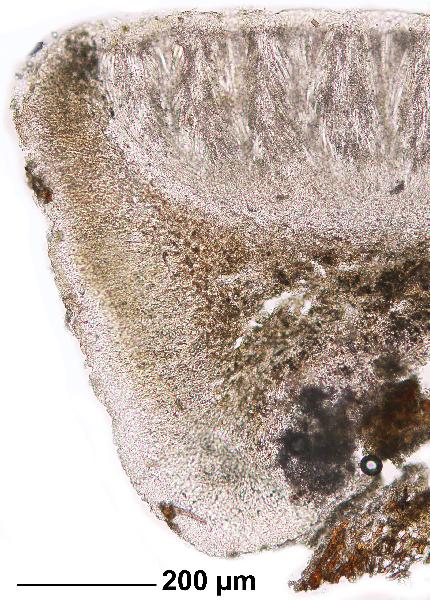

Felix Schumm - CC BY 4.0
[15388], La Reunion, Foret de Bébour, Sentier de Piton Bébour;
21,12860°S, 55,56962°E, 1300 m. Leg. F. Schumm & J.-P. Frahm,
12.09.2009, dt. F. .
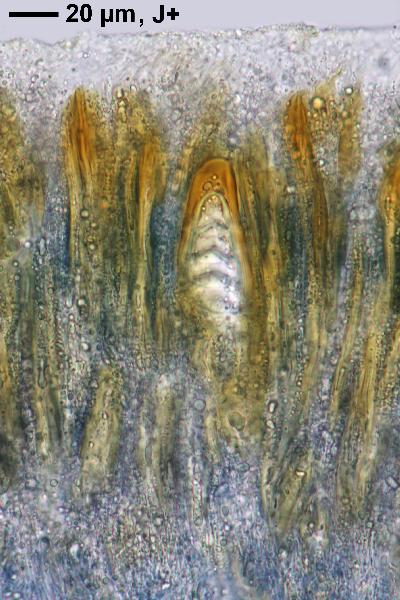

Felix Schumm - CC BY 4.0
[15388], La Reunion, Foret de Bébour, Sentier de Piton Bébour;
21,12860°S, 55,56962°E, 1300 m. Leg. F. Schumm & J.-P. Frahm,
12.09.2009, dt. F. .
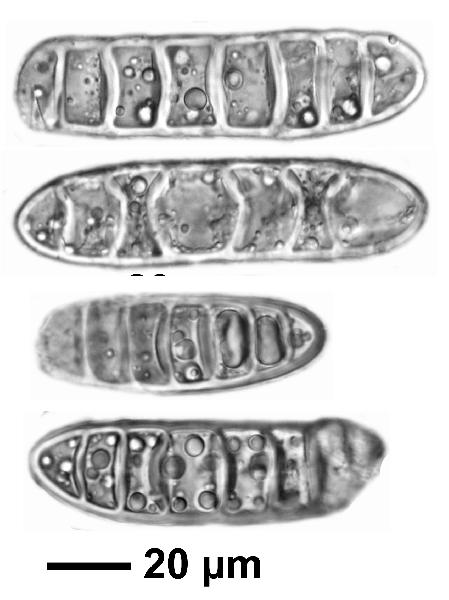

Felix Schumm - CC BY 4.0
[15388], La Reunion, Foret de Bébour, Sentier de Piton Bébour;
21,12860°S, 55,56962°E, 1300 m. Leg. F. Schumm & J.-P. Frahm,
12.09.2009, dt. F. .
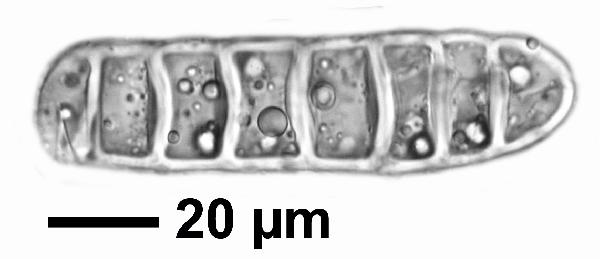

Felix Schumm - CC BY 4.0
[15388], La Reunion, Foret de Bébour, Sentier de Piton Bébour;
21,12860°S, 55,56962°E, 1300 m. Leg. F. Schumm & J.-P. Frahm,
12.09.2009, dt. F. .
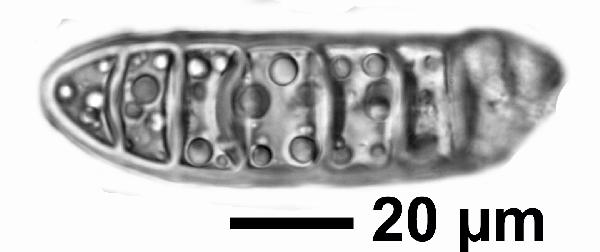

Felix Schumm - CC BY 4.0
[15388], La Reunion, Foret de Bébour, Sentier de Piton Bébour;
21,12860°S, 55,56962°E, 1300 m. Leg. F. Schumm & J.-P. Frahm,
12.09.2009, dt. F. .
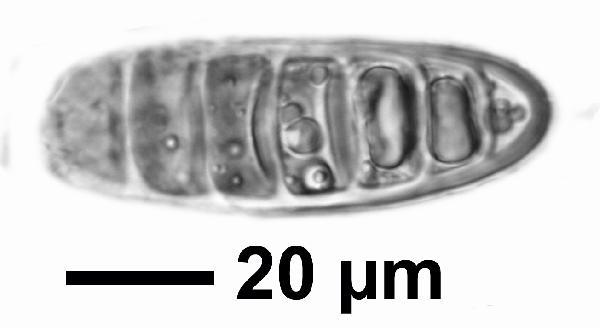

Felix Schumm - CC BY 4.0
[15388], La Reunion, Foret de Bébour, Sentier de Piton Bébour;
21,12860°S, 55,56962°E, 1300 m. Leg. F. Schumm & J.-P. Frahm,
12.09.2009, dt. F. .
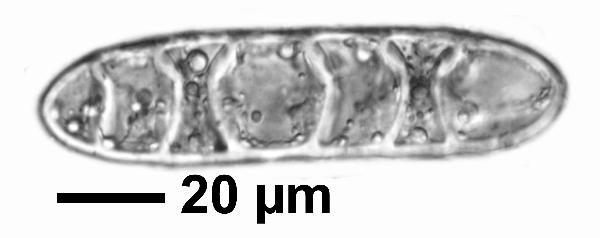

Felix Schumm - CC BY 4.0
[15388], La Reunion, Foret de Bébour, Sentier de Piton Bébour;
21,12860°S, 55,56962°E, 1300 m. Leg. F. Schumm & J.-P. Frahm,
12.09.2009, dt. F. .
Growth form: Crustose
Substrata: bark
Photobiont: green algae other than Trentepohlia
Reproductive strategy: mainly asexual, by soredia, or soredia-like structures (e.g. blastidia)
Restricted to humid-warm, oceanic areas
Commonnes-rarity: (info)
Alpine belt: absent
Subalpine belt: absent
Oromediterranean belt: absent
Montane belt: extremely rare
Submediterranean belt: absent
Padanian area: absent
Humid submediterranean belt: absent
Humid mediterranean belt: absent
Dry mediterranean belt: absent

Predictive model


Felix Schumm – CC BY-SA 4.0
Image from: F. Schumm (2008) - Flechten Madeiras, der Kanaren und Azoren. Beck, OHG - ISBN: 978-3-00-023700-3

Ulrich Kirschbaum CC BY-SA 4.0 – Source: https://www.thm.de/lse/ulrich-kirschbaum/flechtenbilder
Portugal: Madeira. (950 m) on Laurus in laurisilva

Bernard Bouffinier - Source: http://www.lichensmaritimes.org/index.php?task=fiche&lichen=698&lang=en
France, Rosnoen

Bernard Bouffinier - Source: http://www.lichensmaritimes.org/index.php?task=fiche&lichen=698&lang=en
France, Rosnoen

Bernard Bouffinier - Source: http://www.lichensmaritimes.org/index.php?task=fiche&lichen=698&lang=en
France, Rosnoen

Bernard Bouffinier - Source: http://www.lichensmaritimes.org/index.php?task=fiche&lichen=698&lang=en
France, Rosnoen

Bernard Bouffinier - Source: http://www.lichensmaritimes.org/index.php?task=fiche&lichen=698&lang=en
France, Rosnoen

Bernard Bouffinier - Source: http://www.lichensmaritimes.org/index.php?task=fiche&lichen=698&lang=en
France, Rosnoen


Felix Schumm - CC BY-SA 4.0
[ABL50834], Brazil, Alagoas, Quebrangulo, Pedra Talhada plot A2.1. On tree bark in Atlantic rain forest. 9°15’ S, 36°25’35’’ W, 590 m. Leg. M. Cáceres, A. Aptroot (no 50834) & J.G. Cavalcante, 24.07.2019. Det. A. Aptroot,2019.


Felix Schumm - CC BY-SA 4.0
[ABL50834], Brazil, Alagoas, Quebrangulo, Pedra Talhada plot A2.1. On tree bark in Atlantic rain forest. 9°15’ S, 36°25’35’’ W, 590 m. Leg. M. Cáceres, A. Aptroot (no 50834) & J.G. Cavalcante, 24.07.2019. Det. A. Aptroot,2019.


Felix Schumm - CC BY 4.0
[15388], La Reunion, Foret de Bébour, Sentier de Piton Bébour; 21,12860°S, 55,56962°E, 1300 m. Leg. F. Schumm & J.-P. Frahm, 12.09.2009, dt. F. .


Felix Schumm - CC BY 4.0
[15388], La Reunion, Foret de Bébour, Sentier de Piton Bébour; 21,12860°S, 55,56962°E, 1300 m. Leg. F. Schumm & J.-P. Frahm, 12.09.2009, dt. F. .


Felix Schumm - CC BY 4.0
[15388], La Reunion, Foret de Bébour, Sentier de Piton Bébour; 21,12860°S, 55,56962°E, 1300 m. Leg. F. Schumm & J.-P. Frahm, 12.09.2009, dt. F. .


Felix Schumm - CC BY 4.0
[15388], La Reunion, Foret de Bébour, Sentier de Piton Bébour; 21,12860°S, 55,56962°E, 1300 m. Leg. F. Schumm & J.-P. Frahm, 12.09.2009, dt. F. .


Felix Schumm - CC BY 4.0
[15388], La Reunion, Foret de Bébour, Sentier de Piton Bébour; 21,12860°S, 55,56962°E, 1300 m. Leg. F. Schumm & J.-P. Frahm, 12.09.2009, dt. F. .


Felix Schumm - CC BY 4.0
[15388], La Reunion, Foret de Bébour, Sentier de Piton Bébour; 21,12860°S, 55,56962°E, 1300 m. Leg. F. Schumm & J.-P. Frahm, 12.09.2009, dt. F. .


Felix Schumm - CC BY 4.0
[15388], La Reunion, Foret de Bébour, Sentier de Piton Bébour; 21,12860°S, 55,56962°E, 1300 m. Leg. F. Schumm & J.-P. Frahm, 12.09.2009, dt. F. .


Felix Schumm - CC BY 4.0
[15388], La Reunion, Foret de Bébour, Sentier de Piton Bébour; 21,12860°S, 55,56962°E, 1300 m. Leg. F. Schumm & J.-P. Frahm, 12.09.2009, dt. F. .


Felix Schumm - CC BY 4.0
[15388], La Reunion, Foret de Bébour, Sentier de Piton Bébour; 21,12860°S, 55,56962°E, 1300 m. Leg. F. Schumm & J.-P. Frahm, 12.09.2009, dt. F. .


Felix Schumm - CC BY 4.0
[15388], La Reunion, Foret de Bébour, Sentier de Piton Bébour; 21,12860°S, 55,56962°E, 1300 m. Leg. F. Schumm & J.-P. Frahm, 12.09.2009, dt. F. .


Felix Schumm - CC BY 4.0
[15388], La Reunion, Foret de Bébour, Sentier de Piton Bébour; 21,12860°S, 55,56962°E, 1300 m. Leg. F. Schumm & J.-P. Frahm, 12.09.2009, dt. F. .


Felix Schumm - CC BY 4.0
[15388], La Reunion, Foret de Bébour, Sentier de Piton Bébour; 21,12860°S, 55,56962°E, 1300 m. Leg. F. Schumm & J.-P. Frahm, 12.09.2009, dt. F. .


Felix Schumm - CC BY 4.0
[15388], La Reunion, Foret de Bébour, Sentier de Piton Bébour; 21,12860°S, 55,56962°E, 1300 m. Leg. F. Schumm & J.-P. Frahm, 12.09.2009, dt. F. .


